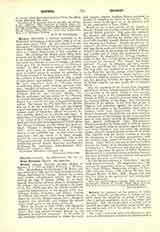

Briand, JOSEPH OLIVIER, seventh Bishop of Quebec, b. in 1715 at Plerin, Brittany; d. June 25, 1794. He studied at the Seminary of St. Brieuc, and was ordained in 1739, but left home secretly to follow Bishop Pontbriand to Canada. Briand was a strenuous worker, self-possessed, tactful, and devoted. During the siege of Quebec (1759), he, as vicar-general, directed the diocesan affairs in the absence of the bishop. He ministered to the dying at the battle of St. Foy (1760), and after the bishop’s death was appointed administrator of the diocese which then included Acadia, Louisiana, and Illinois. During the crisis in New France, when many colonists abandoned the country, Briand foresaw that a change of allegiance was inevitable, and realized the benefit which would accrue to the people of Canada.
When the Treaty of Paris (1763) was signed he ordered a Te Deum for the cessation of the Seven Years’ War and praised General Murray for his humanity towards the conquered. In the midst of the fanaticism which attempted to violate the treatyand hamper religious freedom, Briand appealed to London to maintain the rights of the Church. The British Crown finally gave ear to his demand, and he was consecrated in Paris (1766).
Hailed as the second founder of the Church iii Canada, Briand was joyfully received by the people and the British governor. The pope also expressed his pleasure and approved Bishop Briand’s past attitude, thereby removing the charges that he had acted with timidity towards Murray and Dorchester (see Brasseur and Faillon). Despite his poverty, he declined a gift of the clergy and a plan for his support, and took up his residence at the Seminary of Quebec. Briand’s purpose in reconciling the claims of Rome and London was to insure the permanence of the episcopacy. He demanded two bishops simultaneously, so that the survivor, Rome permitting, might consecrate his successor. This request was finally granted. Through his influence and tact, further plans for perverting the faithful were thwarted. The Test Oath was modified so as to be acceptable to the Holy See, and the passage of the Quebec Act (1774), admitting Catholics to public functions and confirming religious freedom, and of the Habeas Corpus Act, granting Catholics the rights and privileges of British subjects, was also partly due to Briand’s efforts.
After the expulsion of the Jesuits from Louisiana and Illinois Bishop Briand appointed Father Meurin vicar-general in the latter section of the country. When the forces of the Continental army invaded Canada in 1775, he issued a pastoral letter in which he enjoined fidelity to the king. The Continental Congress in an address to the king and people of England had protested against the Quebec Act, while in its appeal to the Canadians there were no features which were objectionable to Catholics. Briand denounced this duplicity and drew attention to the actions of the Colonists twenty years previous both in their cruelty towards the Acadians and their laws against missionaries. Upon Montgomery’s defeat he ordered a Te Deum, and in 1776 he issued another energetic letter in which he urged to repentance those Canadians who had aided the invading troops, whom he characterized as enemies of the Faith. This, together with the drastic measure of refusing the sacraments to all Canadian sympathizers with the Colonial cause, preserved Canada to the British Crown. Later, Briand, who was invited by Cardinal Castelli, the Prefect of the Propaganda, to administer confirmation in Pennsylvania and Maryland, abandoned the plan upon the protest of Father Ferdinand Steinmeyer, S.J. (popularly known as Father Farmer), who drew attention to the anti-Catholic feeling which was then prevalent in the Colonies.
In 1765 Briand published a “Catechism”, the first book printed in Canada. He resigned his see in 1784, and was the consecrator of his two successors: the Rt. Rev. Louis Philippe Marianchau d’Esglis, November 29, 1784, who died June 4, 1788; and the Rt. Rev. Jean Francois Hubert, November 19, 1786. Briand died after fifty-five years in the priesthood and twenty-eight in the episcopate.
LIONEL LINDSAY

